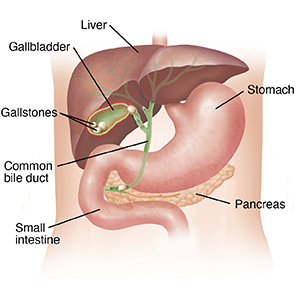The gallbladder stores bile, a fluid made by the liver. Bile helps digest fats in the foods you eat. Gallstones form when certain substances in the bile crystallize and become solid. In some cases, the stones don’t cause any symptoms. In others, they irritate the walls of the gallbladder. More serious problems can occur if stones move into nearby ducts (such as the common bile duct) and cause blockages. This can block the flow of bile and lead to pain, nausea, and infection.
Common symptoms
Gallbladder problems can cause painful attacks, often after a meal. Some people have only 1 attack. Others have many. Common symptoms include:
-
Severe, steady pain or aching in the upper right or middle belly (abdomen), back, or right shoulder blade. This can last from 30 minutes to several hours.
-
A dull ache under the ribs or breastbone.
-
Upset stomach (nausea) or vomiting.
-
A buildup of too much bile in the blood. This causes yellowing of the skin and eyes, dark urine, and itching (jaundice). Call your health care provider right away if this occurs.
Risk factors for gallstones
You are more at risk for gallstones if you:
-
Are female.
-
Have obesity.
-
Have a family history of gallstones.
-
Are older (the risk goes up with age).
-
Have a history of very fast (rapid) weight loss, or weight gain.
-
Have certain intestinal diseases, such as Crohn's disease.
-
Have certain blood diseases, such as sickle cell anemia.
-
Have a family background that includes Native Americans or Mexican Americans.
Diagnosis
Ultrasound is often used to look at the gallbladder and measure the size and exact location of the gallstones. A special MRI test called an MRCP may be used to show the gallbladder, pancreas, and the ducts (pipes) that drain bile if there is a concern that the gallstones have caused problems.
Blood tests are used to measure liver enzymes and bilirubin. Both of these may be high if the gallstones are blocking bile flow or irritating the liver.
Treating gallstones
If your stones aren't causing symptoms, you may choose to delay treatment. But if you've had 1 or more painful attacks, your provider will likely advise removing your gallbladder. This prevents more stones from forming and causing attacks. It also helps prevent problems, such as stones passing into the ducts and causing blockage, infection, or pancreatitis. After the gallbladder is removed, your liver will still make bile to aid digestion.
If you're pregnant
Hormone changes during pregnancy can make bile more likely to form stones. If your gallbladder needs to be removed, your provider will talk with you about the timing for surgery. In some cases, it can be delayed until after childbirth. In others, you may have surgery during pregnancy. This helps protect you and your baby’s health.


